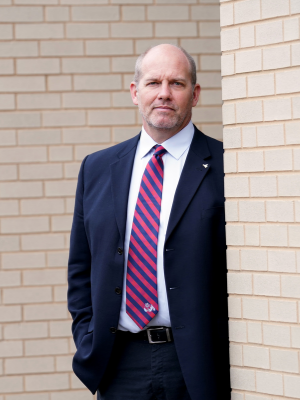Top Dog Alumni Awards
Jason Hubbart, 2000, '02
2022 Outstanding Alumnus Award
Fresno State Library

Jason Hubbart moved with his mother and sister from Fresno to a dairy farm just north of Spokane, Washington. Navigating his childhood with roots in two states had its challenges. But growing up on the farm is where Hubbart found his love for plants, animals and the natural world, leading to his current research related to water resources, land-use practices and climate change.
Hubbart went to college in Spokane after graduating from Roosevelt High School in 1986. He studied hydro-electric engineering. Hubbart said, “I loved the area of study but felt like it wasn’t quite the right fit…I realized I was an ecologist…I thought there was no better time to move to what I viewed as the front lines of the environmental movement, California, and learn to be a progressive protector of natural resources and ecosystems…and spend more time with a side of my family I had never known as well as I’d liked…It was a no brainer. I knew I was going to Fresno State.”
Hubbart enrolled at Fresno State in the fall of 1997 as a zoology major. “I took one zoology class and knew that zoology wasn’t going to be enough. I wanted to know how the whole biological system worked. I wanted to know how all organisms function and how the environment worked, and how it all fit so neatly together, because — what I didn’t realize for a couple more years…was that I wanted to understand the meaning of life.”
From there, Hubbart became an ecology major and earned his bachelor’s in May of 2000.
“I knew before I graduated that I was not done learning. I loved what I was studying, I loved learning, and I loved how education was changing my life in so many fundamental ways. And I loved Fresno State and being around my paternal family. So, I enrolled directly in a Master of Science program in the Department of Biology.”
Hubbart graduated with an master’s degree in forest ecology and mammalogy in 2002.
He taught an introductory biology course at Fresno City College the next year. “On the first day, it was so much fun…I knew exactly what I needed to do next: pursue a Ph.D. so I could continue to learn and do research and teach tomorrow's professionals.”
In 2007 Hubbart completed his doctorate in natural resources with a focus in physical hydrology and watershed management at the University of Idaho. He is currently a professor of physical hydrology and water quality at West Virginia University, where he teaches both undergraduate and graduate students, and advises postdoctoral researchers.
In addition to teaching, Hubbart has served as associate director of research and associate dean of research in the Division of Plant and Soil Sciences and in the College of Agriculture, Natural Resources and Design, respectively, at West Virginia. He has served as agricultural experiment station director in the same college, and he currently serves as interim director of the Division of Forestry and Natural Resource and director of the Institute of Water Security and Science.
“I’m a physical hydrologist, and I’m an environmental bio-physicist…and those disciplines are really all about physics and energetics behind how and why something lives where and how it does. I can tell you exactly how much energy is hidden in a given plant, at any spot on it. I can tell you how much water it’s using. I can tell you how much solar energy it’s taking up, and I can tell you how much incremental biomass it can grow. All of that variability with real numbers…and for agriculturalists and farmers that grow crops, that’s very important.”
Hubbart's current work includes large agricultural research programs in the Northeast region, investigating forest and agro-ecosystem processes, climate change, watershed management and water quality. His work is advancing the understanding of climate change implications for agriculture, forest ecosystem health and water quality.
“There’s no doubt in my mind that climate change is related to human-induced pressures, but there’s also naturally changing climate. The global scientific community has a very poor understanding of what that ratio is, and those relationships are different anywhere you’re standing on the planet. I’m really curious about how all of that works. I’m very interested in maximizing natural resource commodities for the benefit of humans and human health and preserving ecosystems in a sustainable way for future generations.”
Hubbart has received 20 different awards since 2005 and over $45 million in grants since 2007.
“I’ve accomplished so much more than I ever planned to. One of my greatest accomplishments of my life was obtaining my undergraduate degree at Fresno State. Education was not a priority in my house growing up…I’ve tested myself. I test myself, still, constantly…The moral of the story is that it’s okay to make mistakes. Try anyway. It’s okay to fail. You will [fail] again. And sometimes you win, and those moments are oh so sweet. They’re humbling — like the one I’m in right now — so humbling.”